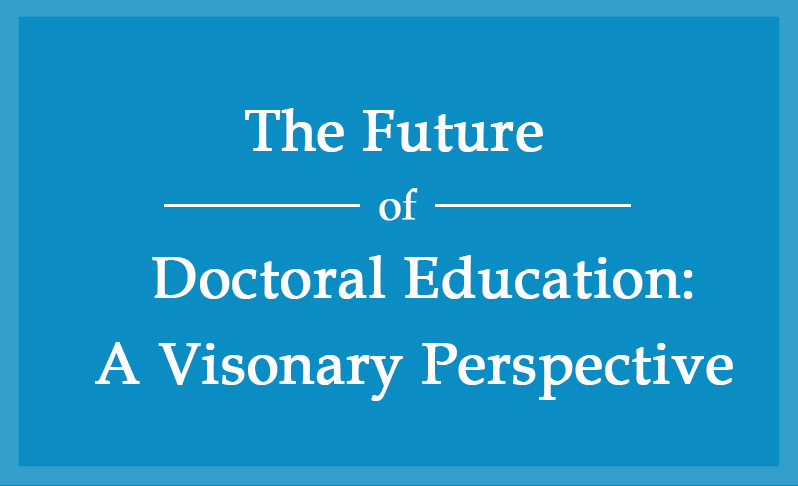The future is an interesting place where we can dream, envision, muse, and create exciting utopian worlds that may one day come to pass. So let me share my vision for the future with you.
I envision that universities and colleges will build Graduate Centers for Scholarship, which will be staffed by dissertation experts, mentors, statisticians, qualitative and quantitative methods experts, professional writing experts, conceptual frames experts, conceptual editors, proposal developers, and digital technologies gurus.
Students on all spectrums of their doctoral educational programs will be welcome to partake of a Center’s resources, whenever needed. This means that students can engage with the Center’s staff and receive support, whether that be in the form of just touching base to ensure they are on the right pathway via Dissertation Wellness Checks, or for statistics checks, or for mentoring support, for example. Currently, such checks are available via the Graduate Center that I direct, and students respond very well to the opportunity to discuss their dissertations and to cultivate career plans on a monthly basis.
Advisor Remains at the Epicenter
The advisor remains at the epicenter of the dissertation process, but surrounding him or her are a pantheon of resources, from writing to conceptualization to statistical analysis, etc. Thus, an advisor’s time is focused in the content research, with the remainder of the dissertation process left to others to manage. Advisors’ oversight will be engaged at the “end”—when chapters are “clean” and when their editorial intervention would be essentially reduced because the copy is in the form of a final draft. In other words, advisors receive what is essentially a penultimate draft for their review; I would anticipate that with the wide circle of experts at the helm, advisors’ time would be conserved for the most salient requirements of the dissertation.
A student in a STEM field (science, technology, engineering, mathematics) will obviously discuss the idea for the dissertation with the faculty member who will sponsor the research. Faculty in STEM fields work closely with their advisees, almost from the inception of students’ programs. However, students in other fields have a different model. When a student has an idea for the dissertation, he or she will come to the Center and meet with proposal developers who will listen to the student’s ideas and help craft a viable concept paper, with the goal of securing approval from the dissertation advisor/chair.
The chair will be accountable for the assessment and evaluation of the final document, and intervening documents (monograph or articles) at various stages, if so desired, but the majority of the work will be handled in the expert collaborative environment of the Graduate Center for Scholarship team, which will have more of a “hands-on” approach. In other words, the arduous work of editing and revising will be handled by the Center’s staff, with penultimate documents provided to the advisor. The advisor will receive a stream of evaluative reports to share with the dissertation committee, but will not necessarily be involved in the daily ongoing activity of the dissertation writing/editing process. Oversight of lab research/content research will remain with the dissertation advisor, but the other dimensions of the dissertation will remain with the Center’s expert staff. The student’s advisor will become an ad hoc member of the Center, but will dovetail his or her content expertise into the entirety of the Center’s work. Since the Center’s staff will all be experts in what they produce, the quality of the dissertation will be enhanced because the structural, organizational, and technical parts of the dissertation will reside with the Center’s experts. In this manner, the advisor’s expertise and time are preserved for those areas most necessary to the integrity of the project: the research.
An Umbrella to Streamline the Process
The idea is to create an umbrella of specialized services and resources to graduate students in an effort to streamline the process, as well as provide a pantheon of elements requisite for graduate student success. Dissertation advising will eventually assume the importance of a disciplinary specialty, with trained individuals who can ensure that advisees have access to appropriate support mechanisms whenever they desire. Think of this idea as part of a natural progression in higher education or a more contemporary approach to contend with the complex issues surrounding doctoral retention. At the moment, this may seem a foreign concept. However, let’s reflect on the practice in years past when emergency rooms were staffed by doctors who essentially had to pull a shift in the ER. The field of medical specialty or expertise did not seem to be considerations: a psychiatrist, although trained as a medical doctor, could end up delivering a baby or treating a patient for meningitis; a general practitioner could end up performing a cardiac procedure. As outcomes were evaluated, perhaps hospitals realized that this approach was not efficient, or safe. Over time, the specialty of emergency medicine emerged. No one talked “emergency medicine” years ago; it is only more recently that it emerges as a bona fide medical specialty.
My hope is that dissertation advising will also become its own specialized area of doctoral education, staffed by experts who understand, appreciate, and are sensitive to the singular needs of doctoral students. Unfortunately, the academy will have to undergo radical changes, and students will have to agitate for more diverse forms of support than ever before.
About the Author
The article is adapted from the newly published book, Navigating the Dissertation: Strategies for New Doctoral Advising Faulty and Their Advisees, by Marianne Di Pierro. She holds the Ph.D. in English from the University of South Florida and has directed the Graduate Center for Research and Retention at Western Michigan University (WMU) for thirteen years. As a graduate education specialist, she conducts research on doctoral education, serves as a conflict resolution strategist for graduate advising faculty and graduate students, participates in national research projects in doctoral education, and serves on dissertation committees.



